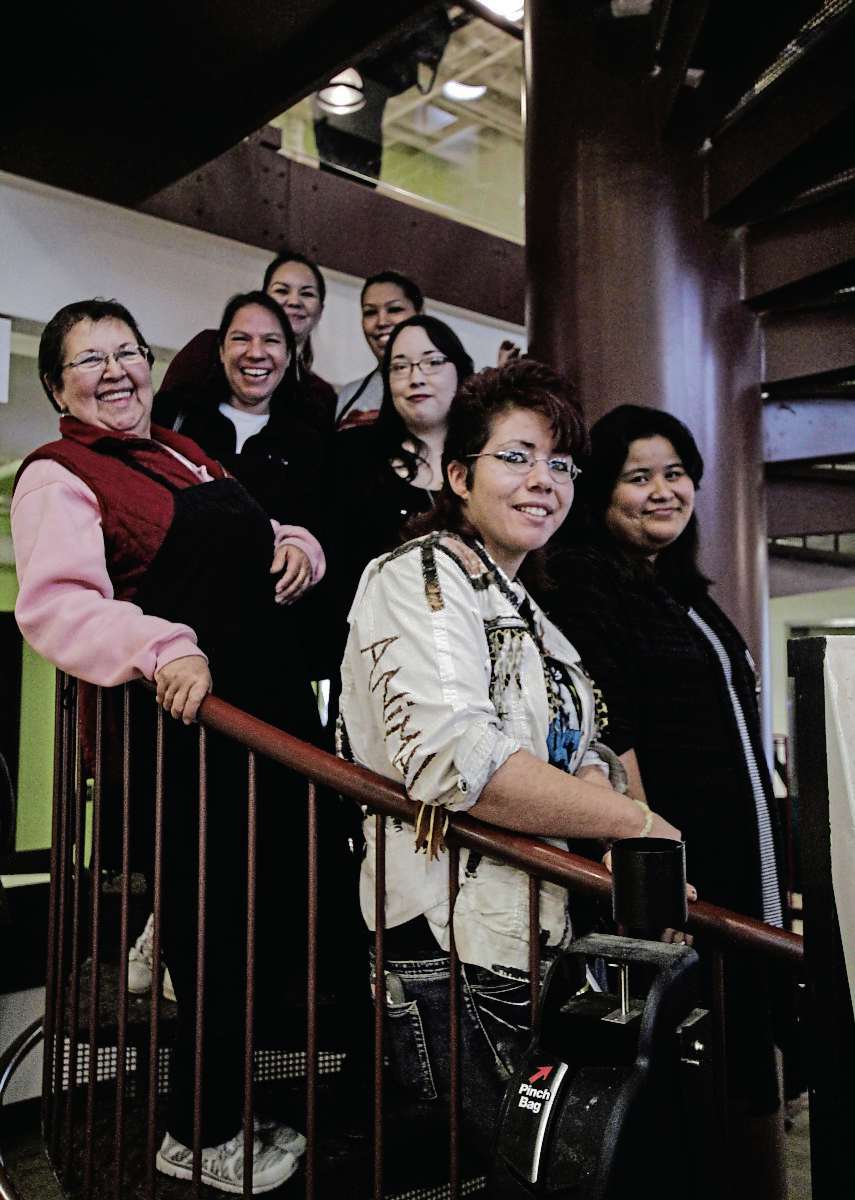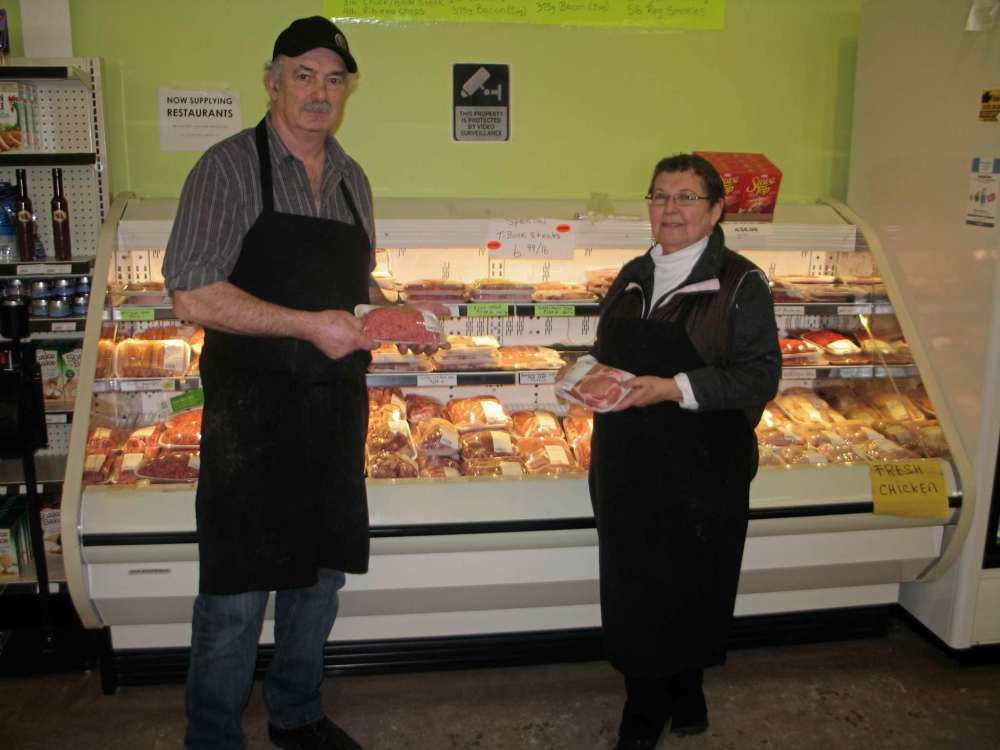Neechi Commons working for success
Advertisement
Hey there, time traveller!
This article was published 03/02/2017 (3165 days ago), so information in it may no longer be current.
Neechi Commons has come a long way since beginning as an idea at a community meeting three decades ago.
Its local impact is significant, as it employs 40 people and supports dozens of artists through its art store. Neechi’s reach is also national as it provides affordable and healthy food to remote communities in Manitoba and Northern Ontario through the Nutrition North Canada.
The beginning

Neechi Foods Co-op president Louise Champagne said its history dates back to the mid-1980s, when she and current financial manager and promotions co-ordinator Russ Rothney worked with the Manitoba Métis Federation to develop and deliver a Métis economic development training program. The pair helped organize economic development committees in Métis communities that selected and trained a community member as an economic development worker. That person’s responsibilities included gathering people to talk about initiatives they would like to see in their regions.
Those workers gathered at meetings in Winnipeg and shared 90 different ideas, Champagne said.
“No one can tell me the problem is a shortage of ideas,” Champagne said. “There never is a shortage of skills to make these things happen, but there’s a shortage of capital to make them happen.”
That list was narrowed down to four concepts that people formed working groups to organize, Champagne added. One became Payuk Inter-Tribal Co-op, a housing cooperative at 500 Balmoral St., while a second became a daycare at the same address (a third idea, an arts and crafts framing shop, failed to materialize).
The fourth concept was a food store.
“Aboriginal people in the North End were saying they needed a decent food store in the area,” Champagne said. “The lowest income families were paying the highest food prices at the corner store, or once a month they would take a taxi to a larger store outside the community.”
Neechi began with a pilot project where a buying group teamed with another co-operative in St. Boniface and bought food which volunteers sold at a market on Selkirk Avenue. They officially opened at 325 Dufferin Ave. in January of 1990, Champagne said.
The education process had only just started, she admitted. An early challenge was deciding how to properly serve a primary clientele with irregular incomes.
“When you’re working in a community that’s poor, people are always cash strapped and always need food,” Champagne explained. “(But) the downfall of a lot of Aboriginal food stores came because giving credit can kill a business.”
Champagne said while it was a difficult decision, Neechi Foods decided to not provide credit. What they did do was allow staff to buy items and clear their tab when they received their next paycheque. Staff could also guarantee payment for a friend or relative, with those totals also coming off at payday.
Neechi’s decision to adopt a worker co-operative model was also challenging, because it takes work to successfully implement, Rothney said.

“Worker co-ops encourage employees to think collectively as business owners. Internationally, worker co-ops are not the easiest model to create but they are easily at the top in terms of high productivity.”
In order for the worker co-operative model to flourish, those workers have to be trained and kept up to date, which has proven to be a challenge for administration, Champagne explained.
“Early workshops need to be continuous, but we got so consumed in running the operation that those happened less and less. To this day they are a challenge.”
A Winnipeg grocery market undergoing drastic change in the 1990s was another obstacle, Rothney said.
“Loblaws from the east and Safeway from the west chose Winnipeg as their battleground. Suddenly after very high prices in the 1970s and well into the 1980s there was a price war between two chain stores, so the advantage was less than it would have been five years earlier.”
Rothney added the recession in the 1990s was another blow, and the environment of low prices made it harder for a new entrant to compete with large corporations.
As Neechi began to establish itself, Champagne and Rothney knew it would have to move to a larger, more visible location if it was to maximize its potential.
“It was a challenge because we were off the beaten path,” Champagne said. “We often envisioned relocating onto Selkirk, Salter or Main Street.”
The former California Fruit location at 865 Main St. became available, but its value was inflated as talk of a Point Douglas football stadium drove property prices up, Champagne said. Neechi’s efforts to obtain a heritage designation for the new location was not approved and that left them to pay expenses that would have been covered had the designation been granted, she added.
But Neechi has persevered, and the combination of growing name recognition, strong growth in its meat department and a reputation as a haven for Aboriginal artists has them on the right path, Champagne and Rothney believe.

Local store with national reach
As Neechi Commons grows more successful, a key driver has been the exponential growth of its grocery and produce sales over the past year, a period coinciding with the hiring of grocery industry veteran Gilbert Kohlman in early 2016.
“When I came here, the first thing I did was lower prices,” Kohlman explained.
Kohlman was able to do that because instead of dealing with co-operatives, he started purchasing from independent buyers and plants, trusted relationships solidified over Kohlman’s years in the industry. Margins increased and costs dropped at the same time.
“If I don’t buy it smart, I can’t sell it smart,” Kohlman said.
Neechi was also accepted into Nutrition North Canada (NNC), a federal subsidy program which provides residents of northern communities with improved access to perishable, nutritious food. NNC directly subsidizes registered northern retailers, southern suppliers, and country food processors and distributors so they can ship healthy food into northern communities via airplane. In most cases, Neechi’s northern customers are able to pay the same prices Winnipeg shoppers do for meat and produce.
The amount of the subsidy depends on how nutritious the food is, Kohlman explained. Using the example of God’s River, Man., Level 1 food items (the healthiest ones) are subsidized at a rate of $1.60 per kilogram, while Level 2 foods merit a rate of $.05.
Shortly after Neechi Commons was accepted into the NNC, Kohlman flew into northern communities to meet chiefs, council members, and social service administrators to promote the program. His efforts have paid off, as Neechi now partners with individuals and businesses in ten communities,
including Oxford House and Wasagamack.
“Our sales have been unreal,” Kohlman said. “People phone in from their home and they place an order for meat, groceries, whatever they need, and we fill it and take it to the airport.”

Neechi Commons staff take the order and process it on the customer’s credit card with the subsidy automatically applied. Orders received by noon one day can often be in the customer’s home by the next day at the latest, depending on flight schedules. Upon ordering, each customer receives a tracking number so they can keep tabs on their order.
While the subsidy plays a key role in the growth of Neechi Commons’ northern food sales, old fashioned customer service cannot be neglected, Kohlman advised.
“People want (responsive) customer service,” Kohlman said. “They don’t want customer service five days from now.”
Finding their niche
Neechi Commons’ gallery has made a name for itself showcasing the work of artists with many different styles.
Artisans flocked to Neechi Niche once it opened, Neechi Foods Co-op president Louise Champagne said.
“In the end it was really quite amazing how the people in the neighbourhood came forward and wanted to place their products here,” Champagne said. “We see that facility representing local artists and artisans, with many living within a 14-block radius. It’s a source of income for producers in the neighbourhood.”
Jade McIvor, manager of the gallery inside Neechi Commons, said those creators range from grandparents making moccasins to established artists with a global presence.
“People starting with dreamcatchers came to us and didn’t even know there art was viable,” McIvor said, while adding Neechi works with all neighbourhood artists regardless of style.
Assistant manager Rachael Campbell said Neechi supports local schools by providing a venue which validates their efforts.
“Young artists see they didn’t just draw a piece for nothing. It actually sold somewhere which gives them inspiration to continue and draw some more.”

“This is something this store is for — it’s for the community,” Campbell said.
Campbell is an artist too. A jeweler, gemologist and goldsmith with 30 years of experience, she owned her own shop for 20 years and sold custom jewelry at pow wows and music festivals.
A Métis woman from Pine Creek reserve, Campbell said her early work was not overly influenced by her culture, but that changed once she discovered Neechi Niche.
“Once I started selling here, I began to make feather earrings and turquoise jewelry.
“It was very enlightening. I have always been aware of my culture but it didn’t have an influence on the jewelry I made until I came here.”
Neechi Niche also assists artists with the business side of their work, McIvor explained. They help them determine which types of art of viable and help them establish a fair price based on materials used and hours invested into each piece.
“Some were underselling just to get money,” McIvor said. “They don’t have to do that here.
“If they weren’t selling here and didn’t have this space to sell their art and make what they want for their art, they’d be on their feet selling it on the streets and in offices.
Instead they bring it to Neechi Niche and pick up a cheque for whatever sold once per month. That frees creators to spend more of their time creating.
“It sells here,” McIvor added. “There is a lot of traffic here, with the grocery store downstairs and the restaurant.”

Because Neechi Niche is growing in popularity among Winnipeggers, it is also attracting family visiting from out of town, McIvor said.
“People within this city who know this place and who have people coming to visit bring them here because they know they are buying something that is authentically hand made and coming from Aboriginal and local artists.”
Comfort food with a few twists
Kelley Hyatt brings a unique set of influences to her role as chef and food services manager for Neechi’s Bison Berry Restaurant and Catering.
“We serve Indigenous-inspired comfort food,” Hyatt said. (But) I’m from the USA and my background is southern cooking so I try to add those elements too.”
An example of both is “North Meets South,” which is Hyatt’s take on the southern favourite biscuits and gravy. It combines homemade sausage in a southern-style gravy with two eggs, hash browns and bannock.
Another is the Bison Berry, which is shredded, slow-roasted bison roast topped with Neechi’s signature blueberry barbecue sauce.
Macâya’s Eggs were inspired by Hyatt’s experience working in a Mediterranean restaurant. The eggs are poached in a spicy tomato sauce with peppers, onions, spinach and chick peas and topped off with feta cheese.
“Macâya is Cree for ‘devil,’” Hyatt said with a smile.
Other selections stay true to the original, Hyatt said. Kookum’s Boule is a traditional Métis dish consisting of meatballs, potatoes and beef gravy.

Hyatt said most items on Bison Berry’s menu are locally sourced, including all meats, the blueberries in the jam (which Hyatt makes herself), and of course the bannock, which is baked on site and included in many of the menu selections.
“It can be used in everything,” Hyatt said. “French toast, hamburger buns and sandwich bread. Bannock pizza is also very popular.”
Hyatt said she began 2017 by introducing a new catering menu she hopes will be popular with their business clientele.
“The schools, agencies and business in the neighbourhood have been very supportive,” Hyatt said, while adding the new menu provides vegetarian, vegan and gluten-fee options.
Bison Berry’s bread and butter — or maybe bannock and butter — is its customers, many of whom live nearby, Hyatt said.
“We make sure the quality is there and the price is right. We keep a close eye on costs so we can pass on the savings to the customer.”
Facebook.com/TheTimesWPG
Twitter: @TimesWPG

Tony Zerucha
East Kildonan community correspondent
Tony Zerucha is a community correspondent for East Kildonan. Email him at tzerucha@gmail.com
Our newsroom depends on a growing audience of readers to power our journalism. If you are not a paid reader, please consider becoming a subscriber.
Our newsroom depends on its audience of readers to power our journalism. Thank you for your support.




